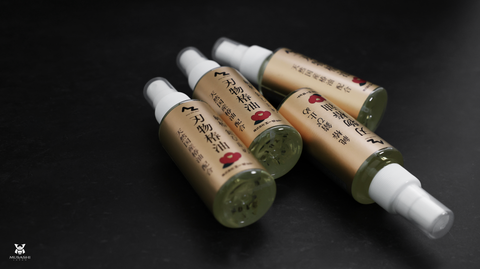Best Oils for Maintaining Japanese Knives

 Best Oils for Maintaining Japanese Knives
Best Oils for Maintaining Japanese Knives
Japanese knives are famous around the world for their exceptional craftsmanship and precision. Many professional chefs and enthusiasts choose Japanese knives for their performance and elegant design. However, due to their high carbon composition, these knives are more prone to rust compared to regular stainless steel knives, and proper care is needed for Japanese Knives.
In this article, we will introduce the best oils for maintaining knives and offer some practical tips to help you keep your blades in top condition for years to come.
Why Oiling Is Important for Japanese Knives?
Japanese knives - especially those made from carbon steel - are highly reactive to moisture and air. When exposed to air and moisture without proper protection, they can easily develop rust or discoloration. Even stainless steel Japanese knives require regular oiling.
Here are some key benefits of oiling your knife:
-Creates a protective barrier that shields the blade from moisture and oxidation.
-Extends the longevity of the knife by reducing wear and corrosion over time.
-Maintains cutting performance by preventing residue buildup that can affect slicing.

Top Oils for Japanese Knife Maintenance
Camellia Oil (Tsubaki Oil)
Camellia oil is the most traditional and widely recommended oil for Japanese knife care. Used for centuries by Japanese blacksmiths - and even samurai for their katanas - camellia oil remains as the gold standard today. Even nowadays, Camellia oil is used for beauty and skincare purposes among many Japanese Ladies.
Why Camellia Oil is great:
Lightweight and non-sticky.
Food-safe and non-toxic.
Offers long-lasting rust protection.
Also used in skincare and haircare, making it a multi-purpose.
Camellia oil is ideal for both professional and home use, especially if you want to honor the traditional Japanese way of knife maintenance.
Food-Grade Mineral Oil
Mineral oil is a widely available, affordable alternative to camellia oil. This oil has no color, smell, or taste, which makes it good for use in knife care. If you can't find camellia oil, mineral oil is a reliable everyday option.
Why Food-Grade Mineral Oil is great:
Safe for food contact
Doesn't go rancid like other cooking oils
Widely available and low-cost
Non-toxic and easy to use
Ballistol Oil
Ballistol is a multi-purpose oil originally developed for firearm and tool maintenance. While it is not a traditional option in knife care, it still works well for protecting knives from rust.
Why Ballistol Oil is great:
Offers strong moisture and rust protection
Lubricates the blade for smooth cutting
Can also be used on wooden handles
Note: Ballistol has a noticeable scent that some people may find unpleasant. This oil is safe for food-contact surfaces when wiped properly, but camellia or mineral oil are still better choices if you are storing your knife for long-term kitchen use.
How to Oil Your Knife Properly
Clean the blade with mild soap and water.
Dry it completely with a clean towel.
Apply a few drops of oil to a soft cloth.
Gently wipe the blade on both sides with the cloth.
Store your knife in a wooden sheath or on a magnetic rack.
Extra Tip: You can also use a bit of oil on wooden knife handles or cutting boards. This helps prevent cracking and keeps the wood well-conditioned.
A Few words about why you should not use Olive or Sunflower Oil for knife care
These common kitchen oils may seem like a convenient alternative, but they are not ideal for knife maintenance. They go rancid over time. Organic oils like olive, coconut, and sunflower oxidize when exposed to air, resulting in an unpleasant smell and sticky texture. These oils provide limited moisture resistance and can even oxidize on the blade, leading to discoloration.
What About Coconut Oil?
Coconut oil is slightly better than olive or sunflower oil. It has some natural antibacterial properties and is slower to spoil. However, it solidifies at cooler temperatures, making it inconvenient to use. Coconut oil doesn’t provide strong rust protection like camellia or mineral oil. However, Coconut oil can be a temporary solution if you don’t have proper oil nearby, but it’s not recommended for long-term use in knife maintenance.
Final Thoughts

If you develop a habit of oiling your knife regularly, you will not only keep your tool in top condition, but you can also build a deeper connection with your tool. It becomes a mindful ritual - a moment to slow down and appreciate the craftsmanship of your knife.
Also, oiling is one of the simplest and most effective ways to preserve the beauty and performance of your Japanese knife. Whether you choose camellia oil for a traditional approach, mineral oil for its affordability, or Ballistol for multi-purpose use, keeping your knife oiled will protect your investment for years to come.
Avoid using cooking oils, as they can go rancid, and remember: a well-cared-for knife is not just a tool - it is a lifetime companion in your kitchen.
Want more knife content? Stay updated on new arrivals, restocks, and more by creating your Musashi Japan account today!
![Rust prevention-[Musashi]-[Japanese-Kitchen-Knives]](http://www.musashihamono.com/cdn/shop/files/Rust-prevention-Musashi-Japanese-Kitchen-Knives.jpg?crop=center&height=140&v=1743651929&width=140)
